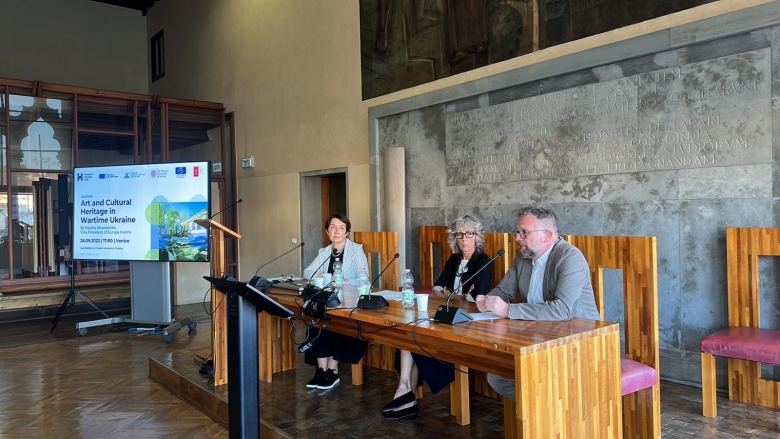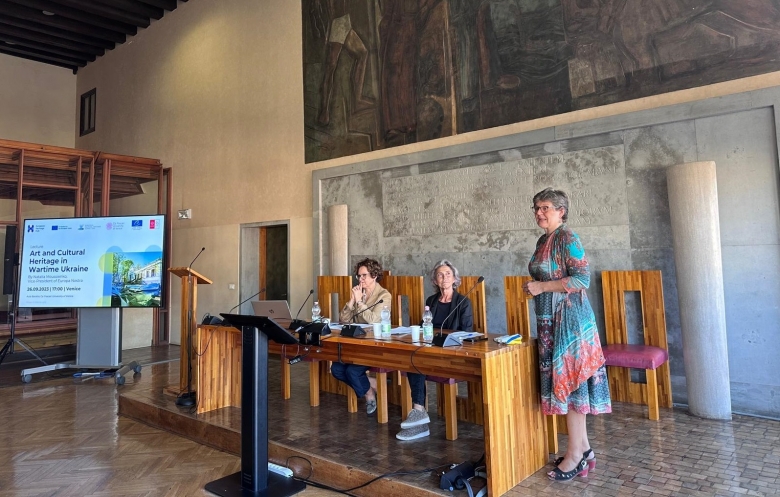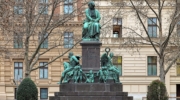European Heritage Summit 2023 sheds a light on art and heritage in wartime Ukraine
The ongoing conflict in Ukraine stands as one of the most pressing challenges confronting Europe today. According to data from August 2023, 1624 objects of Ukrainian cultural infrastructure have been damaged since the onset of the Russian invasion. The European Cultural Heritage Summit 2023 brought this alarming reality to the forefront with a lecture by Dr. Natalia Moussienko, Vice-President of Europa Nostra, titled ‘Art and Cultural Heritage in Wartime Ukraine’. The event was held in the framework of the EU co-funded European Heritage Hub project, in collaboration with Ca’ Foscari University of Venice and the Council of Europe Programme Office in Venice.

Cultural heritage sites have been repeatedly targeted by Russia, which constitutes an attack against the sites themselves, but also against Ukrainian identity. “Russia deliberately targets cultural sites at the heart of Ukrainian identity. Recently, the UNESCO World Heritage Committee, which met in Riyadh has approved the inscription of the sites of ‘Saint-Sophia Cathedral and Related Monastic Buildings, Kyiv-Pechersk Lavra’ and ‘Lviv: the Ensemble of the Historic Centre’ on the List of World Heritage in Danger due to the danger of destruction posed by Russian aggression. In January 2023, the historic centre of Odessa was added to the List of World Heritage in Danger”, stated Dr. Natalia Moussienko.
Artistic expression has become an important vehicle for protest and resilience in wartime Ukraine. Dr. Moussienko presented a diverse array of artistic projects that emerged in response to Russia’s invasion, originating not just from Ukraine but also from other European countries like Latvia, France, Italy, and Germany. During her exploration of street art’s impact as a tool for public expression, Dr. Moussienko spotlighted heroes and protagonists within this genre, notably the Ukrainian army, women in vyshyvanka, and the artist Konstantyn Koshanovsky.
In light of these new artistic narratives, social media has become a key platform to raise awareness, including increased popularity of strategic war memes. The Vice-President of Europa Nostra delved into the symbolism surrounding “enemies,” where Russia and Putin stood out as prevalent figures, often serving as symbols of anti-peace sentiments. Worth noting is also the innovative materials used by Ukrainian artists as canvases, such as of wires and barriers.
“The war has entered into all areas of Ukrainian art and impregnated them with new narratives: artists create an emotional encyclopaedia of the war. It is important to analyse the artistic reflections on the war in a time framework and in a historical and cultural context”, she added.
Insights from European partners
Sneška Quaedvlieg-Mihailović, Secretary General of Europa Nostra, also took part in the event, along with Luisella Pavan-Woolfe, Director of the Council of Europe, and Professors Fabrizio Panozzo, Monica Calcagno and Tiziana Lippiello, Rector of Ca’ Foscari University of Venice. All three partner organisations expressed their support to the people of Ukraine and applauded the powerful artistic response in the face of adversity.

Luisella Pavan-Woolfe delved into the issue of illicit cultural heritage export and emphasised the importance of gaining practical experience in preserving and restoring artefacts amidst wartime conditions, and brought attention to the International Conference held in Riga in June 2023 on the adequate criminal justice response in the context of the Russian war against Ukraine.
Sneška Quaedvlieg-Mihailović, Secretary General of Europa Nostra, expressed her gratitude for Natalia Moussienko’s work and commended her for sharing the story of the war through art on the occasion of our European Cultural Heritage Summit 2023: “Peace should never be taken for granted (…) Democracy and the rule of law are the cornerstones of Europe, and to have a healthy democracy cultural heritage must be put at the centre.”
Speaking on behalf of Ca’ Foscari University of Venice, Professor Monica Calcagno recognised Ukrainian cultural heritage as both a victim of war and a catalyst for a powerful artistic response. Highlighting the need for mainstreaming across all areas, Monica Calcagno stated that heritage should not remain within the realm of specialists but should engage people both within and outside the sector. Images, like those presented by Dr. Natalia Moussienko, foster a sense of participation, with street art serving as a collective means of expressing and safeguarding cultural heritage.
Politics was not exempt from the discussion. Professor Fabrizio Panozzo from Ca’ Foscari called for greater appreciation of the role of art in society, stressing the need for culture to be a reflective and active force rather than a passive one solely focused on wealth.






